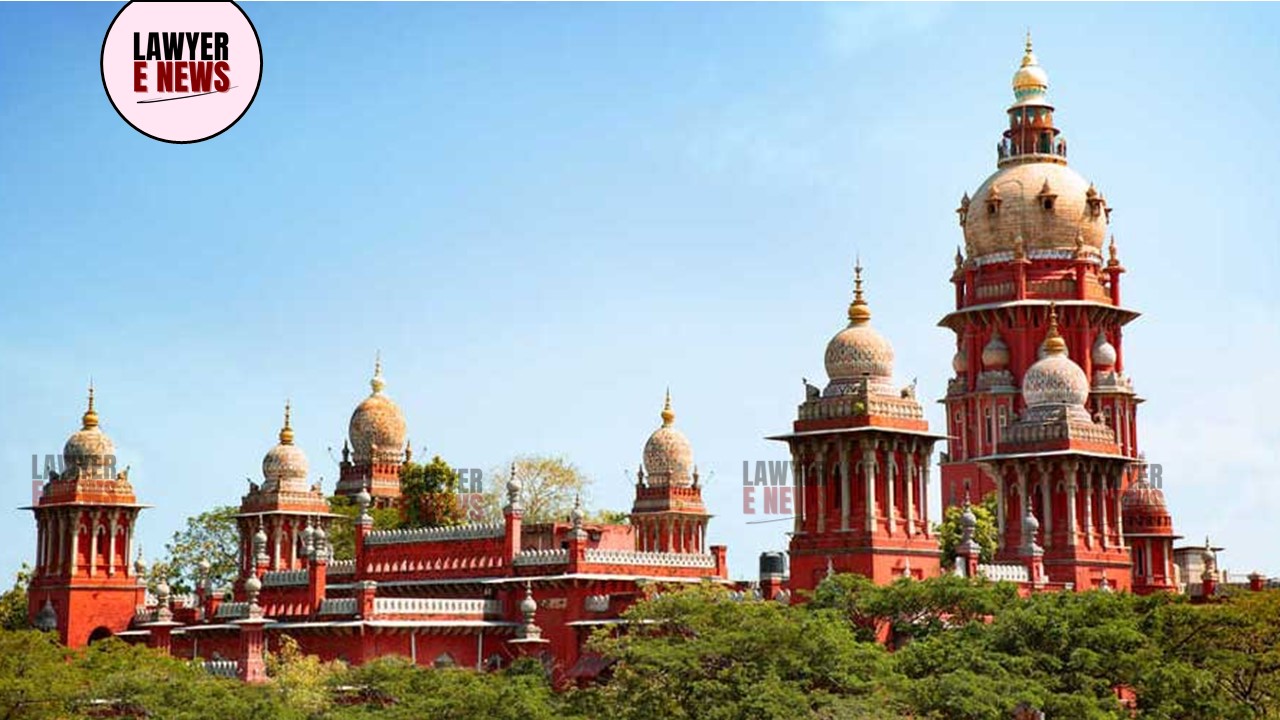-
by Admin
15 February 2026 5:35 AM



Madras High Court, presided by Dr. Justice G. Jayachandran, allowed a petition to quash a defamation complaint filed by AIADMK member R.M. Babu Murugavel against the Speaker of the Tamil Nadu Legislative Assembly, Mr. Muthuvelaydha Perumal Appavu. The court held that the complainant lacked the requisite standing under Section 199 of the Code of Criminal Procedure, 1973 (Cr.P.C.), as he was not a "person aggrieved" by the alleged defamatory statement. The ruling reaffirms the requirement for complainants in defamation cases to demonstrate direct harm or explicit authorization to file on behalf of an aggrieved party.
"Mere Political Affiliation Does Not Confer Standing to File Defamation Complaint"
In its judgment, the court cited Subramanian Swamy v. Union of India (2016), noting that under Section 199(2) Cr.P.C., the term "person aggrieved" implies a direct connection to the alleged defamatory remarks. Justice Jayachandran observed that mere political affiliation with the AIADMK party did not grant the respondent the legal standing to file the complaint, as he neither suffered direct harm from the statement nor held formal authorization from the party to represent it in court. As a result, the complaint was quashed for lack of locus standi.
The defamation complaint arose from a speech made by Speaker Appavu on November 21, 2023, at a public function, in which he reportedly suggested that following the death of former AIADMK leader J. Jayalalithaa, as many as 40 AIADMK MLAs were willing to defect to the ruling DMK. The respondent, R.M. Babu Murugavel, a joint secretary in the AIADMK's legal wing, filed the complaint on behalf of the party, claiming that the statement was defamatory to AIADMK’s reputation.
Following this, the Special Court for MP/MLA cases took cognizance of the complaint and issued summons to Mr. Appavu. The Speaker subsequently filed a petition under Section 528 of the Bharatiya Nagarik Suraksha Sanhita, 2023 (BNSS), seeking to quash the complaint on the grounds of lack of locus standi, procedural incompatibility with the new legal framework, and lack of direct injury to the complainant.
The primary legal issue was whether Mr. Murugavel, as a member of AIADMK, qualified as a "person aggrieved" under Section 199 Cr.P.C., a prerequisite for filing a defamation complaint. Citing Subramanian Swamy v. Union of India, the court emphasized that the complainant must have a direct and substantial connection to the alleged defamatory content or be explicitly authorized to represent an aggrieved entity.
The court noted that Mr. Murugavel did not suffer any personal injury from the alleged statements, nor did he hold an official mandate from AIADMK to file the complaint on the party's behalf. "The respondent cannot assume the position of an aggrieved party simply by virtue of his political affiliation," the court stated, highlighting that the complaint failed to demonstrate how Mr. Murugavel or his party was directly defamed.
The petitioner argued that the complaint, filed post-enactment of the BNSS, 2023, was procedurally invalid as the Cr.P.C. had been repealed and replaced with the new code. The court addressed this contention, clarifying that under Section 531(2)(a) of BNSS, 2023, legal proceedings for offenses occurring before July 1, 2024, continue to be governed by the old Cr.P.C. Thus, the complaint's filing under the Cr.P.C. remained valid.
The court reasoned that Section 4 of BNSS, 2023, together with the savings clause in Section 531, ensures that rights and liabilities under the previous code are preserved for events prior to the enactment of the new code. As the alleged defamation occurred in 2023, the court held that procedural continuity under Cr.P.C. was applicable in this case.
The court analyzed the substance of the complaint and determined that Mr. Appavu’s statements did not specifically target Mr. Murugavel or cause him direct injury. Furthermore, the statements referred to AIADMK MLAs broadly and did not explicitly defame the party or its members in a way that warranted legal redress by an individual AIADMK member without formal authorization.
The court reiterated that defamation complaints require a "specific legal injury" to the complainant or an explicit authorization to act on behalf of an affected party. In this case, the respondent's political affiliation alone was insufficient to establish standing. The court cited John Thomas v. K. Jagadeesan (2001), emphasizing that the determination of "person aggrieved" must consider whether the complainant has a reasonable cause to feel personally defamed by the remarks.
The Madras High Court quashed the defamation complaint, ruling that the respondent lacked locus standi, as he was neither directly injured by the remarks nor authorized by AIADMK to act on its behalf. The court also upheld the procedural validity of filing under Cr.P.C. for pre-BNSS offenses. Accordingly, the related miscellaneous petitions were dismissed.
The term "person aggrieved" in defamation cases under Section 199 Cr.P.C. requires a direct connection to the defamatory statements or explicit authorization to act on behalf of the affected party.
Political affiliation alone does not grant standing to file a defamation complaint if the complainant is not personally injured or authorized to represent the aggrieved entity.
Offenses occurring before the enactment of BNSS, 2023, are governed by the procedural framework of the Cr.P.C., 1973, under the savings clause.
Date of Decision: October 25, 2024
Mr. Muthuvelaydha Perumal Appavu @ M. Appavu v. R.M. Babu Murugavel
